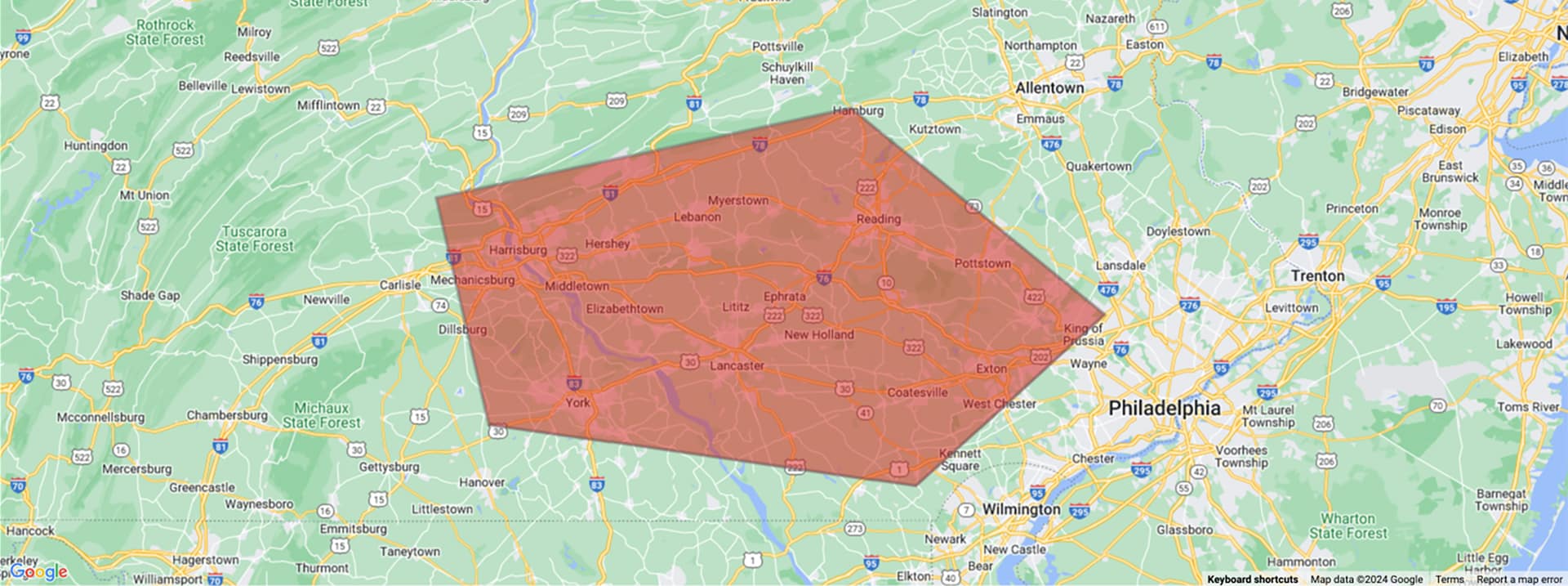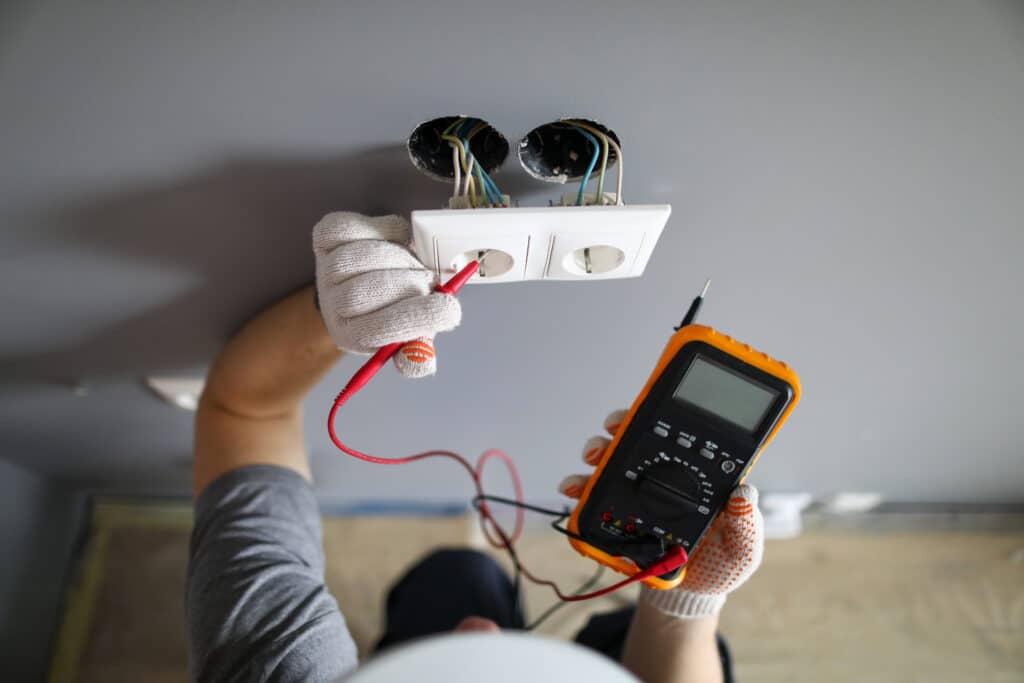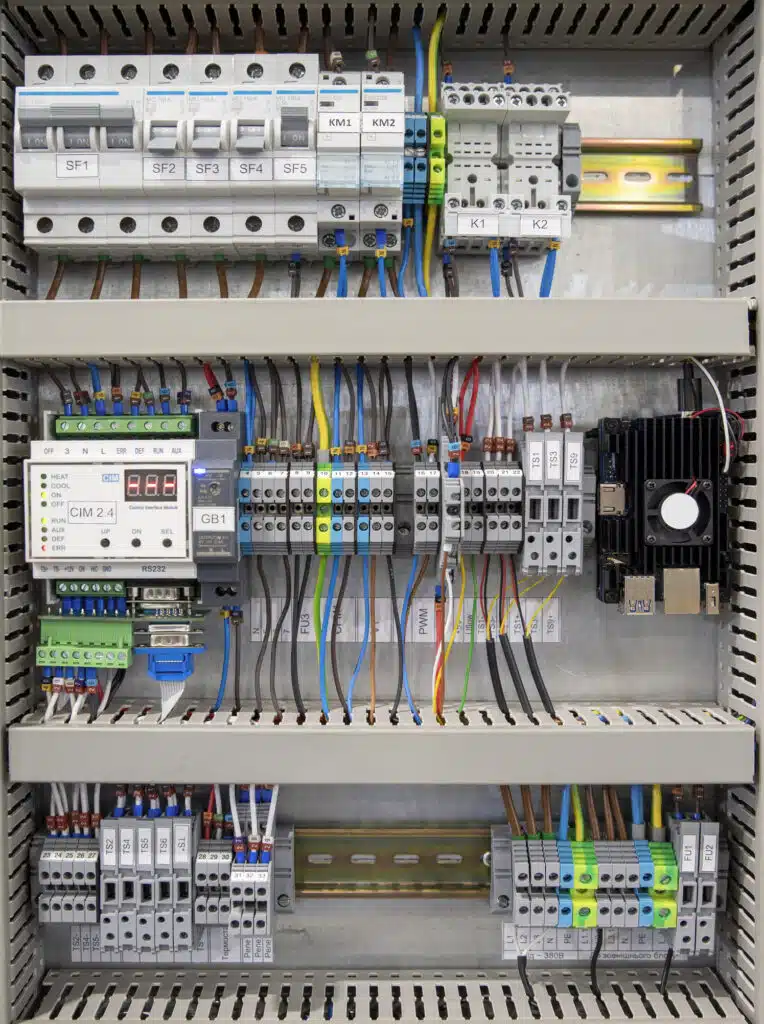Ever wonder why your lights flicker or your circuit breakers trip more often in the winter? It could be because of the increased electrical load from your heating devices. When the temperature drops, many people in areas like Lancaster, PA, York, PA, and Harrisburg, PA start using space heaters, electric blankets, and other appliances to stay warm.
But if you don’t manage your electrical load properly, it can lead to overloaded circuits and even safety hazards. Let’s explore how to keep your home safe and energy-efficient this season!
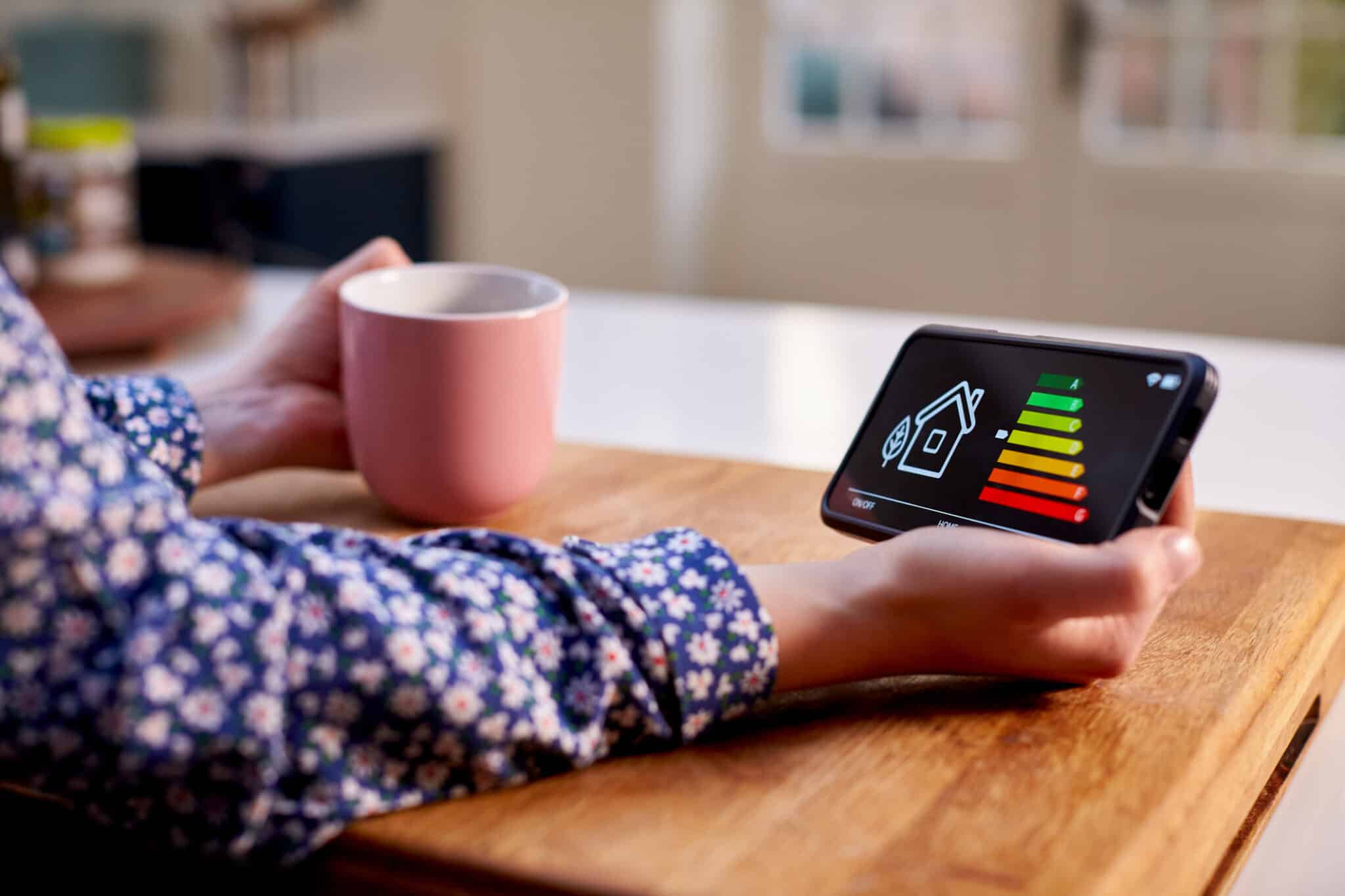
Understanding Electrical Load
What is an Electrical Load?
Electrical load refers to the amount of electricity your home needs to run various appliances and devices at the same time. Picture it like the total weight your home’s electrical system has to carry—too much weight, and it starts to strain.
When you have multiple heaters, kitchen appliances, and electronics on, it puts more pressure on your system, especially during colder months.
This can cause issues like overheating, tripped breakers, or even damage to your wiring if not managed properly. That’s why it’s important to understand what electrical load is and how it affects your home’s safety and efficiency.
Types of Electrical Loads
There are three main types of electrical loads you should know about, and each one interacts differently with your home’s system:
- Resistive Loads: These are devices that convert electricity into heat, like electric stoves, toasters, and space heaters. They draw a lot of power quickly and can spike your electrical load.
- Inductive Loads: These include appliances that use motors, such as refrigerators, washing machines, and fans. Because motors need an initial power surge to start, these loads can sometimes cause lights to dim momentarily.
- Capacitive Loads: Although not common in most homes, devices like power supplies or certain types of lighting fall into this category. They store and release energy, which can make balancing your load tricky.
Understanding these types helps in deciding which appliances can run together without overloading the system.
Why Managing Electrical Load is Important
Safety Concerns
One of the biggest reasons to manage your electrical load is safety. When your home’s system is overloaded, it can cause wires to overheat, which can lead to electrical fires.
For example, if you’re running a space heater, electric oven, and hair dryer all at once, your system might struggle to keep up.
This extra strain can cause circuits to overheat, potentially resulting in melted wires or burnt outlets. Properly balancing your electrical load helps prevent these dangers and keeps your home and family safe.
Energy Efficiency
Managing your electrical load isn’t just about safety—it’s also about saving energy and cutting costs. When you’re mindful of your load, you can avoid wasting electricity by using devices efficiently. For example, using energy-efficient appliances or staggering your usage helps reduce the total power your home consumes.
This not only saves you money on your monthly utility bills but also helps reduce your overall energy footprint. By keeping your load balanced, you ensure that your home is running more efficiently year-round, even during the winter months.
Factors Affecting Electrical Load
Weather Conditions
Weather can have a significant impact on your home’s electrical load. During colder months in areas like Lancaster, PA, York, PA, and Harrisburg, PA, heating devices are in high demand, leading to a sharp increase in your home’s electrical load.
Space heaters, electric blankets, and HVAC systems run for longer hours, creating a higher electrical load on your system, which can put more pressure on your circuits. This spike in power usage can cause circuits to become overloaded, especially if your system is not designed to handle such a large electrical load.
Conversely, in the summer, the use of air conditioning units and fans results in a similar rise in electrical load, stressing your system in a different way. Understanding how seasonal changes affect your electrical load can help you plan ahead, use energy more efficiently, and reduce the risk of overloading circuits, ensuring a balanced electrical load year-round.
Household Activities
The activities happening in your home also play a major role in how much electricity is being used at any given time. Routine tasks like cooking and laundry can quickly add up, especially if they are done simultaneously.
For example, running a dryer, dishwasher, and multiple kitchen appliances at once can cause a spike in power consumption, increasing the chances of tripping a circuit breaker. During holiday season, the use of extra lights, electric decorations, and multiple devices for family gatherings can lead to sudden overloads.
Being mindful of how and when appliances are used allows you to distribute energy usage more evenly throughout the day. Simple changes, like using high-demand appliances at different times, can help keep your system balanced and reduce the risk of power issues.
Signs of Overloaded Electrical Systems
Flickering Lights
If your lights often flicker or dim when you turn on certain appliances, it’s a clear sign that your electrical system is under strain. This usually happens when a large appliance, like a heater or a refrigerator, kicks on and demands a lot of power at once.
Flickering lights might seem harmless at first, but they indicate that your circuits are struggling to keep up with the demand. This can lead to inconsistent power flow, making your electrical system work harder than it should.
Ignoring this sign can lead to bigger issues down the road, like overheating wires or even electrical fires. If you notice frequent flickering, it’s time to assess what’s causing the problem and either reduce usage or have a professional electrician evaluate your system. Don’t wait for a minor flicker to become a major safety hazard!
Tripped Circuit Breakers
Circuit breakers are designed to protect your home by shutting off power when the load becomes too high. If you find yourself frequently resetting breakers, it’s a sign that your system is overloaded.
For example, running a space heater and a hair dryer on the same circuit might cause a trip because the combined load is too much for that circuit to handle. This isn’t just annoying; it’s also a safety risk.
A breaker that trips too often is trying to tell you that your wiring can’t support your current power needs. Constantly tripping breakers indicate that your system needs to be rebalanced or upgraded to handle your household’s demands.
Leaving this issue unresolved could result in serious electrical failures, melted wires, or even a fire. It’s better to address it early before it turns into a major expense.
Burning Smells or Discoloration
A burning smell or discoloration around outlets and switches is a serious warning sign of an overloaded electrical system. When circuits are pushed to their limit, wires can overheat and start to melt, causing a noticeable odor similar to burning plastic or rubber.
If this happens, you might also see scorch marks or yellowing around outlets, which suggests that the wiring behind the wall is getting too hot. This kind of overheating can easily spark a fire if not addressed immediately.
If you experience this, turn off the power immediately and call a professional. Never ignore these signs, as they could lead to dangerous electrical fires or permanent damage to your system. Catching these problems early is key to preventing a potentially devastating situation.
Strategies to Manage Electrical Load
Load Assessment
Before making changes, the first step is to assess your home’s electrical load. Start by identifying which appliances and devices are using the most power. Large items like heaters, ovens, and washers are the biggest culprits.
You can use a home energy monitor to measure how much electricity each appliance consumes. Once you know where the most power is going, you can figure out how to adjust usage. A detailed load assessment helps you understand where the strain is and where to start making changes to keep everything running smoothly.
Prioritize Essential Appliances
Not all devices need to be on at the same time. Prioritize essential appliances to avoid overloading your system. For instance, if you’re using a space heater, you might want to hold off on running the dishwasher or washing machine until later.
This reduces the chance of too much demand at once. Make a list of essential items that need to be on simultaneously and turn off less critical devices when they’re not in use. Learning to prioritize can keep your system balanced, preventing sudden power surges and circuit trips.
Use Energy-Efficient Devices
Switching to energy-efficient devices is one of the easiest ways to manage your electrical load. Look for appliances with the Energy Star label, which means they use less electricity without sacrificing performance.
LED light bulbs, smart thermostats, and modern heaters can all significantly reduce your overall power consumption.
By replacing older, power-hungry appliances, you’ll lessen the strain on your system, especially during high-demand periods like winter. Not only will this make your home safer, but it will also save you money on your energy bills in the long run.
Scheduling Electrical Use
Peak vs. Off-Peak Hours
One effective way to prevent power issues in your home is to consider when you’re using most of your appliances. Electricity companies often charge more during peak hours—times of the day when many people are using power simultaneously, like early evenings.
Shifting some of your energy use to off-peak times can help reduce demand on your home’s circuits and save you money.
For example, running your dishwasher or doing laundry later at night can ease the overall burden on your system. Check with your local utility provider to see if they have specific peak and off-peak times.
Creating a Usage Schedule
Creating a household usage schedule can help you distribute power usage throughout the day. List out the main appliances you typically use and plan when to run them to avoid overlap.
For instance, if you plan to use the washing machine in the morning, wait until later to run your space heater or other high-power devices. This scheduling helps reduce stress on your electrical system and minimizes the risk of tripped circuits.
By spreading out your appliance use, you create a balanced flow of electricity, which can keep your home running smoothly and safely.
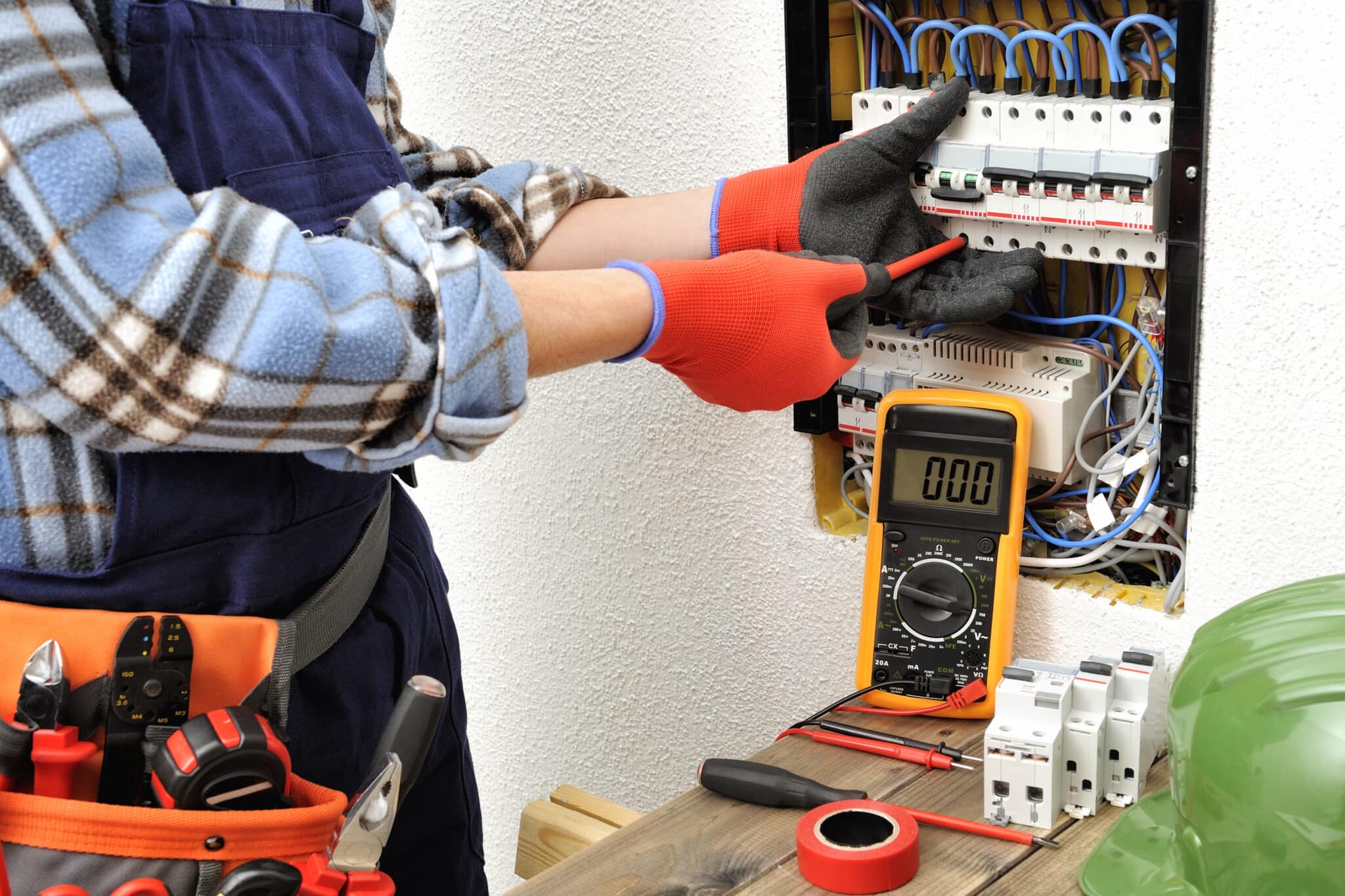
Importance of Electrical Inspections
Regular Inspections
Regular inspections by a professional electrician are crucial for maintaining a safe home. Over time, wiring, outlets, and circuits can wear down or become damaged, especially if your house is older.
A professional inspection ensures that your system is up to code and can handle the demands of modern appliances.
Experts recommend having your electrical system checked every few years, or more frequently if you notice warning signs like flickering lights or tripped breakers. Routine inspections can catch small issues before they become big, expensive problems.
Identifying Potential Issues
During an inspection, an electrician will look for potential hazards, such as frayed wires, loose connections, or outdated components. These problems might not be noticeable to the untrained eye but can lead to dangerous situations if left unaddressed.
For instance, old wiring may not be able to handle the increased demand from modern heating appliances, leading to overheating.
By identifying these risks early, you can upgrade or replace faulty components to keep your home’s system running safely and efficiently. This proactive approach helps prevent accidents and ensures everything is working as it should.
Cost-Effective Solutions for Load Management
Upgrading Electrical Panels
One of the best long-term solutions for managing your home’s power needs is upgrading your electrical panel. Older homes often have panels that can’t handle the demands of today’s appliances, especially during winter months when heating systems are in heavy use.
By upgrading to a higher-capacity panel, you can safely run multiple high-demand devices without worrying about tripped breakers or overheating. While this may seem like a big investment, it prevents costly repairs down the line and increases the overall safety and efficiency of your home.
Investing in Smart Technology
Smart home technology can help you manage your power usage more effectively. Devices like smart thermostats, smart plugs, and energy monitors allow you to control when and how your appliances are used.
For example, a smart thermostat can adjust your heating schedule automatically, keeping your home warm without overloading circuits. Smart plugs can turn off non-essential devices during peak times, helping balance usage.
By using technology to monitor and adjust your power consumption, you can optimize your home’s energy use and avoid common issues like overloaded circuits.
Ready to Keep Your Home’s Electrical System Safe This Season?
If you’re in Lancaster, York, or Harrisburg, PA, and want to ensure your home’s electrical system can handle the demands of seasonal heating, Mister Sparky of Lancaster is here to help!
Our team of experts can inspect, upgrade, and optimize your system for safe and efficient use. Don’t wait for a problem—schedule a professional service today and keep your home running smoothly all year long!
Frequently Asked Questions (FAQs)
What is an electrical load?
An electrical load is simply the total amount of power your home uses at any given time. Each appliance, device, or light that’s turned on adds to the load. If too many are in use at once, it can strain your home’s electrical system, potentially causing issues like flickering lights or tripped breakers.
How can I tell if my electrical system is overloaded?
Common signs of an overloaded system include flickering lights, frequently tripped circuit breakers, and outlets that feel warm to the touch. You might also notice burning smells or discoloration around the outlets, which indicate that the wiring is overheating. If you spot any of these signs, it’s important to reduce the load and call a professional for an inspection.
How often should I have my electrical system inspected?
It’s recommended to have your electrical system inspected every three to five years. However, if your home is older, you might want to schedule inspections more frequently. Regular inspections help catch issues before they become dangerous and ensure your system is up to date with current safety standards.
What can I do to reduce my electrical load during winter?
To reduce strain during the colder months, try using energy-efficient appliances, turning off non-essential devices, and staggering the use of high-demand items like space heaters and ovens. Creating a schedule for when to use certain appliances can help prevent overloading circuits.
Why should I upgrade my electrical panel?
Upgrading your electrical panel is necessary if your current one can’t handle the demands of modern appliances. A new panel allows you to run more devices safely, reduces the risk of electrical fires, and prevents frequent breaker trips. It’s a good investment, especially if you plan to add more high-demand devices to your home.
How can I safely use multiple heating devices at the same time?
To safely use multiple heating devices, avoid plugging them into the same outlet or power strip, as this can overload circuits. Instead, distribute them across different circuits in your home. Make sure to use space heaters with built-in safety features like automatic shut-offs, and never leave them unattended. If you’re unsure which outlets are on the same circuit, consult a professional electrician to avoid overloading and ensure your home’s safety.






